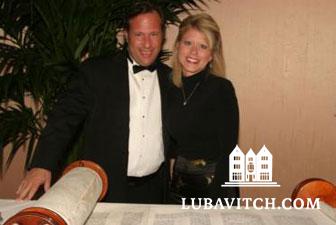How many lost Jews are there? No one knows, but speculation is that the numbers are huge. A new organization is going to help people uncover lost Jewish roots.
Mysterious postcards written in Yiddish. Gravestone rubbings. Grandma’s deathbed confession. These fragments are often the first hints of long buried Jewish roots. A new organization formed to help those convinced that they are Jews collect the proof they need to be accepted in the wider Jewish community, is hard at work establishing guidelines and procedures.
This week, Jewish legal authorities from east coast yeshivas and Talmudic academies in Israel are meeting in Los Angeles to hammer out the policies of Shlach Amee V'yavdoonee, headed by Chabad of Bel Air director Rabbi Chaim Mentz. Forming a Beth Din, a rabbinical court, of Jewish legal experts who represent the entire spectrum of strictly Orthodox Jewry will preclude disputes about the legitimacy of Shlach Amee’s protégés. Jewish-American genealogist Gary Mokotoff, a noted author, lecturer and developer of genealogy software tools, will brief the group on document authentication, and St. Louis businessman Craig Shapiro, Executive Director of Shlach Amee, will be on hand at the meeting that will establish what could be a major bellwether for the future of Judaism. “From one person who is found to be Jewish, you can now have three or four related families who may enroll their children in Jewish camps. Times that by 500 cases, and you need a new day school,” he said.
No one knows for sure how many lost Jews there are, but speculation is that the numbers are huge, tucked away among descendants of children placed in non-Jewish orphanages after the Holocaust; great-great-great-great granddaughters of Jews who shed religious ties after moving out west; offspring of outwardly WASPy closet Jews.
According to traditional Jewish law, Judaism is a birthright handed down through the matrilineal line, without regard to level of religious observance. Former Secretary of State Madeline Albright’s late-life revelation of her Jewish roots was no surprise to members of Chabad-Lubavitch whose active outreach to unaffiliated Jews around the world has made these shockers commonplace.
Wendy Armstrong, 37, didn’t set out to find a Jewish branch in her family tree. Armstrong started researching her family history as a way of reconnecting with her beloved grandmother, who passed away when Armstrong was 12. When Armstrong got as far as her great-great-grandmother’s placement in a St. Louis orphanage in 1880, she made a startling discovery. In her ancestor’s file was a note written by great-great-great-grandfather that opened with a Hebrew abbreviation for “Baruch Hashem” or “Blessed is G-d.” Armstrong started to pursue confirmation of her Jewish lineage. She flew to Utah to search Mormon genealogy centers and to New York to sift through old marriage licenses.
When she presented her findings to a Beth Din, the officiating rabbis asked for more and more proof. But genealogists fees to authenticate documents, travel expenses, and the emotional ups and downs along the way, took their toll. “In my heart I knew I was Jewish. To be turned down felt like I was being told I wasn’t good enough,” she said. Dogged efforts and Rabbi Mentz’s assistance eventually resulted in confirmation of Armstrong’s Jewish status by the bet din – no conversion was necessary. Since publication of her saga by the Jewish media, many people wishing to pursue their hint of Jewish lineage have contacted Armstrong; Rabbi Mentz says he receives calls regularly.
Once Shlach Amee formally opens, the confirmation process will be just as scrupulous, but a lot less taxing. The group will not actively seek potential Jews, but those who approach the organization with proof of a Jewish link will have Shlach Amee’s access to subsidized genealogical expertise and guidance for meeting bet din standards. “We want to take away the paperwork,” said Rabbi Mentz. Throughout the process, the group will offer emotional support. “It can be a very scary change,” said Armstrong. “It is very important to have someone to talk to.”
It’s an unusual cause with an equally unusual name. Shlach Amee V'yavdoonee is a Hebrew phrase from Exodus meaning: “release My nation, that they may serve Me.” According to Rabbi Mentz, “We are looking to help people who wish to find their Jewish roots and, if confirmed, live as Jews.” Simply digging up Jews roots as a sort of genealogical exercise is not the point of the organization, nor is demanding complete observance of freshly identified Jews.
Today, Armstrong continues a journey that she began back in 2003. She’s moved a Jewish section of St. Louis, lights Shabbat candles, attends classes at her local Chabad, and studies by phone with Rabbi Mentz. “Once I found out that my family was Jewish, it was like a light bulb went on," said Armstrong. "I just got it. It was like, 'A-ha!' It was an eye-opening experience."

Be the first to write a comment.